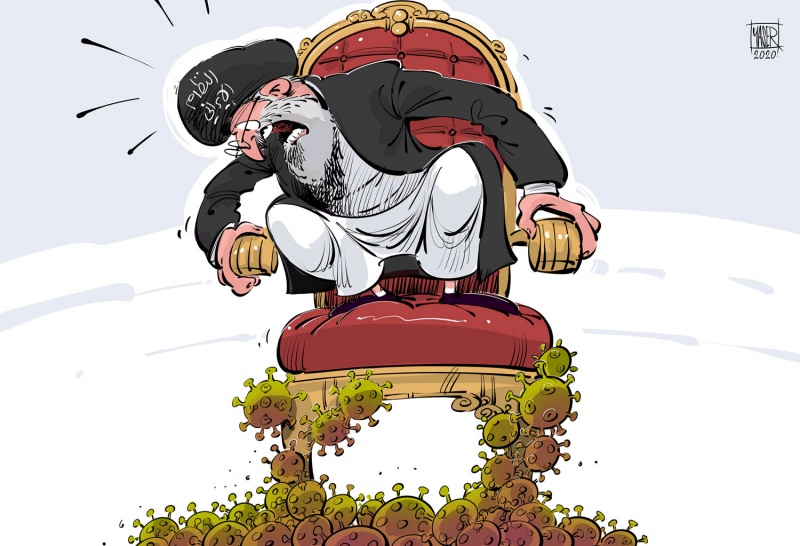Iran regime won’t negotiate with US until after 2020 presidential election
Dr. Majid Rafizadeh/Arab News/June 04, 2020
د.مجيد رفيزادا: النظام الإيراني لن يتفاوض مع أميركا إلا بعد الإنتخابات الرئاسية ومعرفة من سيفوز
The Islamic Republic is experiencing one of its worst financial situations since its establishment more than four decades ago. This could bring about the collapse of Iran’s economy and endanger the hold on power of the ruling clerics.
After US President Donald Trump assumed office in January 2017, his administration began imposing a “maximum pressure” policy on the Iranian regime. Several allies, including Germany, France and the UK, expressed opposition to this strategy. And, since the US took this tougher position against Tehran unilaterally, some scholars, policy analysts and politicians believed it would be unlikely to have a significant impact. However, they underestimated its effects.
Those who initially underestimated the US maximum pressure policy, including the Iranian leaders, failed to comprehend the leverage that Washington still has over the global financial system. For example, although many countries such as China sided with Iran when the Trump administration reimposed sanctions on its energy sector, they ultimately succumbed and reduced their oil imports from Iran. Before the US Treasury Department leveled secondary sanctions against Iran’s oil and gas sectors in November 2018, Tehran was exporting more than 2 million barrels per day (bpd). In just a year, its oil exports went down to less than 200,000 bpd — a decline of roughly 90 percent.
In addition, despite the EU’s efforts to circumvent the US sanctions through its INSTEX mechanism, Iran’s revenues continued to decline. This is largely due to the fact that European companies did not want to risk their business with the US or be denied access to America’s financial systems by dealing with the Iranian regime. The Trump administration has been insistent that any move to bypass US sanctions would have severe consequences. That is why many European firms and corporations, including French energy giant Total, immediately abandoned plans to invest in Iran.
In one of the latest decisions aimed at tightening the maximum pressure policy against the theocratic establishment, Washington last week announced that it will terminate the sanctions waivers that permit Russian, Chinese and European companies to work at Iranian nuclear sites when they expire in July. Secretary of State Mike Pompeo justified the decision by pointing out: “The Iranian regime has continued its nuclear brinkmanship by expanding proliferation-sensitive activities.” He added that this “will lead to increased pressure on Iran.”
With this mounting pressure and with its economy on the verge of collapse, will the Iranian authorities finally come to the negotiating table? The history of the Islamic Republic teaches us that, whenever it has been under significant pressure economically and geopolitically, it has agreed to negotiate with the West because it realizes financial austerity could pose a threat to the power of the political establishment. Furthermore, the loss of revenue due to the US sanctions makes it extremely difficult for Tehran to continue supporting, training, sponsoring, funding and arming its proxies and militias across the Middle East.
In 2012, UN and US economic sanctions against the Islamic Republic reached their peak and, ultimately, the Iranian leaders negotiated the 2015 nuclear deal with the P5+1 world powers. As a result, the Iranian government received billions of dollars thanks to sanctions relief, joined the global financial system, gained legitimacy, and secured and ensured its hold on power.
Nevertheless, at this critical time, although the Iranian regime is cash-stripped and facing an unprecedented level of pressure domestically, it will most likely wait to negotiate until the US presidential elections are held in November and the outcome becomes clear.
This is due to the fact that any negotiation with the Trump administration would be a severe blow to the ruling mullahs. The regime has endured several years of economic austerity and it can wait another six months. From the Iranian leaders’ perspective, if they negotiate with Washington now, they are basically admitting defeat and, more importantly, handing Trump a significant foreign policy achievement, which he could capitalize on in the upcoming campaign. He would be able to state that his maximum pressure policy succeeded in bringing the Iranian leaders to the negotiating table.
If they negotiate now, they are basically admitting defeat and handing Trump a significant foreign policy achievement.
As a result, Tehran will wait another six months in the hope that former Vice President Joe Biden wins the election and reverses America’s policy on Iran to what it was under Barack Obama.
In a nutshell, it is unlikely the Iranian regime will negotiate with the Trump administration before the presidential election. But, if Trump does win in November, Iran will either have to negotiate or face a total collapse of its economy and political establishment.
Dr. Majid Rafizadeh is a Harvard-educated Iranian-American political scientist. Twitter: @Dr_Rafizadeh






















